How Mental Health Impacts Artistic Productivity: Thoughts from 20 Creatives
How do depression, mania, anxiety, stress, and other conditions affect the ability to create?
I work with artists/writers/creatives to help them understand the relationship of health to creativity in their own lives in order to achieve holistic wellness and success.

These are all excerpts from interviews that I’ve previously shared here, providing insight into the myriad ways that what’s going on in the brain, body and life impacts what we create.
I have been honored and humbled to interview hundreds of creatives over the years. How various aspects of personal psychology impact productivity is one of the topics that comes up over and over again.
Here are some examples with links to the original full interviews.
From
:“When depression is "on," I find it impossible to do anything. I really hate every idea that comes out of my mind and hands. When it's "off," I love nothing more than sitting in front of a blank page with no real objective other than to enjoy being in front of a blank page. I have an idea in my mind of maybe three, maybe ten, essential turning points or images... then I just "go." It can be crippling. It can be amazing. It can be mundane, too.”
From
:“With my painting, pottery, photographs, and knitting – I create art that looks and feels peaceful and soothing. Creating helps to heal my nervous system. Having anxiety took a toll on my nervous system; creating helps to restore it. However, there are days where I’m dealing with difficult situations that leave me (and my nervous system) spent. It’s hard to create when I’m feeling drained, so I prioritize rest those days instead of pushing myself to create. Because of anxiety, I have to be careful about doing what’s right for me. Even though my platform might grow faster if I wrote blogs and newsletters more often, I do it every two weeks, so that I still enjoy writing without feeling too much pressure. If I’m staying true and authentic to myself (which healing anxiety has demanded I do), I have to produce in a sustainable way. Otherwise, my writing gets watered down and my mental health declines. [also] Creating hinders my mental health when perfectionism rears its ugly head, paralyzing me from creating. It’s something I’m working on. Giving myself permission to make mistakes and knowing that mistakes will probably happen helps.”
From
:“I tend to be drawn to fantasy and rely heavily on my dreams for material. When I'm unable to sleep, I find my production is affected and I'm off balance. It's not at all pretty.”
From
“Productivity is always a bit or a weird thing in art anyway. All the artists I know feel very unproductive, even when to an outsider they are making a lot of work. I suppose it is because there is so much testing and experimenting, which have no linear, clearly visible connections to productive outcomes. You can be working long, busy hours in the studio and producing very little finished work. So when the amount of time and energy you can put into your studio practice drops with health things, it feels like you are heaping failure on top of failure at being productive.”
From
:“I have been a writer since I was very young, but didn’t get the theater bug until I was 11 or 12. I’ve been a playwright since I was 15 years old, but took a detour into acting until I was out of college. I am still primarily a theater artist, but have been writing more prose recently. I keep coming across stories and the beginnings of novels that I started and ultimately abandoned, which is interesting. I never had the attention span to follow through.Now that I am medicated, I am taking another look at my approach and my process. I am still learning how my brain works, and what makes me excited or interested. ADHD is very much an interest- and novelty-based disorder, so it does often make it difficult when the project becomes tedious or is a lot of struggle. I have to find new ways to reinvigorate myself. Before I was diagnosed, there were times that finishing a project felt impossible. The beautiful thing about making theater is that it's an inherently collaborative process. Yes, you write alone, but you can bring together actors and directors and hear pages out loud in a room. This is an exciting and fun part of playwriting, and can help you solve a problem in real time. Playwriting as a career can be grueling. Not only do you have to write the plays, you need to see shows, join writer’s groups, apply for opportunities, and network. Even before the pandemic, I was feeling serious burnout. Not to mention that very few playwrights make their living from playwriting, so most of us have some other form of income. This means a lot of 14 hour days. It certainly doesn’t get easier as you get older. The constant rejection also takes its toll. I found it more and more difficult to manage my ADHD and do all the things I needed to do to get my work seen. There are definitely ways my ADHD and my anxiety/depression held me back. My most recent fallow period was lengthy, and I didn’t actually complete a full length play for over three years.”
D says:
“I started going to school to be an artist because that's what people wanted. But I woke up one day and decided "fuck it" it's not what I want. I didn’t know what I wanted because I wasn't given the chance to actually explore. I never went back to school for art. And in fact I didn’t pick up a pencil to draw for almost 10 years. Then, I actually started going to art therapy. It wasn't art that I hated; it was the people and the experience I was going through around it. I'm now exploring my fun artsy side with my therapist and I'm having so much fun. Cheap coloring pencils, a blank sketch book, and an adult coloring book is all I need to explore this aspect of myself. I wasn't sure what to expect but I love it. Visually seeing how things were laid out in front of me gave the validations I needed, realisations I needed, and a good look into what I want for myself in the future.”
From
:“I sometimes can't or don't follow through, though that has gotten better recently. I've been working on following through consciously, because I've always been that way. At other times, I go for long periods where I'm not creating or writing anything, because I can't muster the motivation.”
From Nessa:
“When it comes to creating my art, I struggle heavily with motivation. I often feel so tired and drained mentally, that it frustrates me all of the time. I become irritable and I feel alone. I feel discouraged and I feel disconnected from my work because I’m my mind it’s like I want to peruse my work and my dreams so bad, but then I find myself laying in bed and crying because it’s like I just can’t. That motivation and that drive to get up and out of the bed sometimes really is just the hardest step. My mental health symptoms have drastically forced me to change the direction in which I create my art. Sometimes, this includes just beginning my art. For modeling for example, I used to set up and schedule ahead, plan my shoots, coordinate my outfits, hair and makeup, etc. but now, it’s like I do it when it’s convenient for me. There is no more planning heavily for it, it’s more of I do one thing at a time, instead of planning for a shoot all at once. With my writing, I used to write poems and articles easily and with so much creative freedom used to express myself. Today, I still write and publish my work, but it takes a lot longer, and often times, I struggle to even finish pieces. Currently, I have pieces I’ve wanted to publish for years now, but still haven’t manifested the strength to do so, because I just feel so drained.”
From
“The hopelessness and exhaustion can interfere tremendously with my plans, and of course, the sheer effort required to remain engaged and committed means that I am much slower than I wish.”
From
:“During a severe mental crisis, whether it is a manic episode or depressive episode, I have a difficult time focusing on my writing. However, I do find it much easier to write during depression phases than when I am going through a manic phase. For me mania almost always leads to a state of psychosis. I am reluctant to share too much in this interview about specific episodes, I am working my way towards writing about that in my serial Where the Sunbeams End. However, I will say that psychosis for me completely turns my world upside down. Delusional thinking runs rampant. It's a state where my mind moves so quickly and jumps to conclusions very easily. It's like blasting off into another galaxy. Looking back at my various episodes, I realize that I was "off my rocker," as I like to say, but deep down these episodes and ways of thinking remain with me. I still fear falling back into a psychotic state because it has mostly resulted in chaos and regret. I've lost many friends who have experienced my behavior during these episodes. My life has been greatly affected by bipolar, which in turn affects everything about my writing. One thing that bipolar has taught me is having compassion for all beings. Forgiving and understanding myself is what I'm still striving for, but my work as a writer seems to be helping me along this journey. … I struggle most with intrusive thoughts. It's as if my brain never shuts off! That pesky voice inside or stream of internal words. Many of these thoughts are negative in nature, what you might refer to as the critic. Often this symptom slows down my writing, sometimes even bringing it to an all out halt. So, although I am getting better at coping, it still requires quite a bit of energy to find the peace of mind to write. To find that zone.”
From
:“I spent a large part of my career fueled by anxiety and depression. The good part of that was that I was very productive to keep the voices at bay. Yes, anxiety fueled me for much of my career. So, while I still had the same issues that most people have with anxiety, it didn't paralyze me. I was able to harness it into doing work at a level that I still can't believe. For instance, I wrote 22 books in 22 months before I burned out, and I've written over 40 novels since 2011, along with producing over 1,000 pages of comics. Almost all of that came from my need to be productive to "burn off" my anxiety. All of that was just so the anxiety monster in my brain would shut up. I fould it took 5,000 words a day for it to be quiet. That's probably how I was able to keep going for so long, now that I think about it. Even though the depression made me spiral, the anxiety was so powerful that I kept making new work to stifle it. However, whenever anything at all went wrong in my business, even something very minor, I would quickly spiral to the worst-case scenario and it would paralyze me. I couldn't enjoy anything good because I just knew bad things were coming. Honestly, I don't even know how I ran a business for so long with how bad it got. I started medication at the beginning of 2020. While I've been productive throughout my whole career, it started the most productive time in my whole life. I wrote 28 books in the span of 36 months, but then I burned out and have only written one novel in the past 18 months. I've been doing a lot of non-fiction, though, and my friend said that I'm more productive being burnt out than most writers are at the peak of their productivity. The best way I can describe the change is that I no longer have to fight my way back to neutral. Before medication, I would start the day in a deep dark hole and it would take everything just to get back to neutral. Anything could knock me off or derail my mood, and then I would spiral. After meds, I started at neutral and am usually able to get at least some moments of positivity throughout the day. It's exponentially easier to get to positivity from neutral, and it takes far more to derail my life than it did before.”
From
:“Originally I had a highly organised routine. I time recorded and was very goal orientated and efficient in the same way I was in law. I worked on my art as a semi-professional studio routine in the evening after work, time recording as good lawyers do! I was driven, confident and productive and sure of what I was doing. The depression and anxiety ultimately gave me more time and freedom to work creatively as it resulted in an ill-health retirement so I had all the time in the world and no financial worries. However, the depression and anxiety also attacked that confidence and sense of purpose. I had more time but now - some 3 years on from the peak of the illness I still struggle to create a routine the way I did. I still have the lurking voice that says "Oh what’s the point? You know this was never your proper job. It doesn't really matter. No one needs this the way you were needed in law..." It's a cruel destructive voice combined with a certain flatness, a lack of essential vitality that I am left with. Together it makes it hard to feel I am making any meaningful progress. I dabble more, have more periods of unproductivity and avoidance, am much less sure about my place. Much more existential angst. More time in the doldrums. … When I was slipping down the slope of combined depression, anxiety, burnout and PTSD, I had two very big shows scheduled with an exhibiting partner. I was off work from the law job but still producing art and loving doing it. Until one day I wasn't and I rang my partner to say I needed to pull out. It felt like the art was where I put the residual determination until one day it just ran out. I was like a cartoon character who runs over the cliff and keeps on running in thin air until suddenly they plunge down the ravine. Leah, my partner, came round the next day and persuaded me I could indeed meet the commitment. I dropped some ambitious plans, switched from time-consuming textile art to quicker print methods and the shows went well. Then I had a deep fallow period with little production. Subsequently, I was asked to do a solo show at a new gallery and in response rallied and produced about 70 pieces of work in 7 months but then again slumped. I hope this is simply a much-needed rest and recuperation process - one that was extended because of having to cope with two very serious health situations with my husband who needed full-on care in what would have been my recovery time. I am much less motivated by sales, or external forms of success measurement than I was because those were very much mirrored in the law job that made me so ill. On the one hand I want to throw myself wholeheartedly into creative work and have so many ideas and possibilities and no reason not to embrace it. But I am also afraid that hard work will once again hurt me. So I retreat. The press to productivity has become associated with harm to my mental health in my mind to the extent I recoil from it. But without it, the tag end of the illness seems to make it harder to activate the desire to create for the joy of it, for exploration or experimentation. To play, to set goals... I am flattened and my concentration has definately been diminished. Though I know play and creativity are a medicine to me, the symptoms make it harder to take that medicine.”
From
:“Our health and mental health is so, so precious. We often don’t realise how lucky we are to be well until we’re not. As for me personally, if I am not mentally well, then I don’t have the ability to work, to put time into my relationships, to take care of myself or to do much at all. So, I put time and energy into my mental health every single day. Without it, nothing else matters. When we’re well, everything in life can get the time and attention they deserve. Those stressors and challenges that can really throw us off in a bad moment become easier to deal with, because we have some resources available, even if they’re still hard.”
From
:“ I was more obsessive about writing, I was more productive, but I also wrote more garbage and I was much less happy overall. Now that I write when I feel like it, I would say that it is a core contributor to my mental health. Same goes for music.”
From
:“I have been acutely aware of burnout and making sure to take steps to prevent it. I am also aware of how depressive cycles sometimes prevent me from being able to engage in anything outside of survival, so what I am attempting to do is work consistently, but also when it makes sense. I have been in a good place mentally recently, so I haven't had too many struggles with how it correlates to producing, but rather using reflection in my writing work to help me continue to do the work of mental health.”
From
:“My previous corporate job caused immense stress and depression, leaving me devoid of creative energy. Frequent panic attacks and insomnia only added to this creative block, which I am grateful to have finally overcome. It felt like being trapped in a dark tunnel without hope of finding the light. Fortunately, therapy played a pivotal role in guiding me through this tunnel, reminding me that I am inherently creative and no job should have such control over me. It was a significant turning point where I prioritized my well-being and creativity over a paycheck for the first time.”
From
“Aside from the more general ebbs and flows of creative energy, I’ve experienced two periods of extreme burnout in my life. The first was at 17, right as I moved away from home and entered college. The second was at 31, after leading a company that gained more public exposure than I thought possible. In both situations, I was leaving a situation where I was living 100% for other people, and not myself. Every moment I was awake was devoted to spinning 100 plates and giving every piece of myself to try to keep other people happy. As I left those situations, I crashed. The parallels of the second instance to the first was fertile ground for therapeutic intervention and an examination of my past, and my view of my own worth.”
From
“The sad truth is that, at least in my experience, the relationship between mental illness and art is much more often one of frustration and inhibition than inspiration. Most of my patients who are artists or have artistic inclinations find their efforts at creation hampered or totally destroyed by psychological difficulties or outright mental illness. I’ve had a number of psychotherapy patients who were artists or academics whose output has ground to a halt because of depression, crippling anxiety, or other problems that don’t fit neatly into our diagnostic categories”
Anonymous: “At one point, after being medicated I couldn’t create the same. Everything about art felt dull and flat. I was on like five different medications at one point. Now I’m on one medication and I can create holistically again and better than ever I think. When I experienced mania, (or so I have been told it was mania) I felt like I had a huge rush and burst of energy to create music. I would make these songs that resembled the planets and universal frequencies of relaxation. Like I said earlier, once I was on a cocktail of medication, it took me years of trying to figure how to make music again. It was like a wholly different process. Completely different. I went from being the art itself to learning to channel it consciously. Very confusing and hard to do at first but then I became more and more comfortable trusting my instincts and intuition to create again. Without fear of failure or a doctor telling me I was doing something wrong again.”
From
“Sometimes those conditions fuel my creativity. They inspire (or compel) me to write honestly about the ups and downs of my life. I write about how I make it through the most difficult times and sometimes eventually benefit from them. My weekly newsletter, “Changing Lives,” chronicles my journey and quotes others whose lives or writing inspire me (including Kathryn). I also created a Depression and Anxiety Survival Kit (free PDF download) of simple things that help me cope so I can help others feel better, too. I now have an online shop where my best photos of the scenery and animals I see when I walk in the park to calm down are available on a wide variety of products. Other days depression and anxiety kick my ass and it’s challenging to just get out of bed and get dressed. I cry most of the day, or pace anxiously and hyperventilate because I’m so scared about the future. I’m absolutely certain my life and the world’s problems will inevitably get worse and I’d be better off dead. I get stuck in a spiral of negative thoughts about how worthless I am and how much better other people are. Then I beat myself up for beating myself up instead of loving myself, being grateful for what I have, or doing something that would help me feel better. Thankfully, that doesn’t happen as often now, and I no longer wish I was dead. I’m also getting better at loving myself and paying attention to my needs instead of condemning myself for not being productive enough or making more money. I’m learning that I’m actually more productive and the quality of my work is better when I take breaks and allow myself to walk in the park, read a novel, or take a nap.”
If you read this far, perhaps you liked the work. The work does take work. It only continues with support, so please consider subscribing.






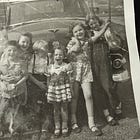
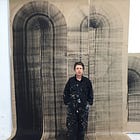

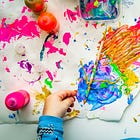


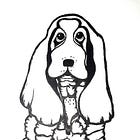
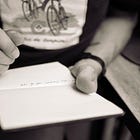

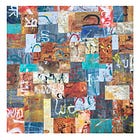
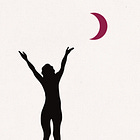
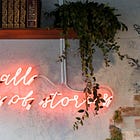



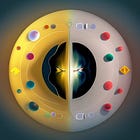


So delighted for the mention, Kathryn